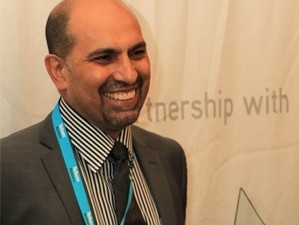
SA is obsessed with failure, but there is no innovation without failure; and failure is the primary vehicle for success.
That was the message from Sal Laher, CIO of Eskom and winner of the 2013 CIO Visionary of the Year Award, addressing the 2014 IITPSA President's Awards yesterday.
According to Laher, freedom to fail means a freedom to explore, venture, experiment and succeed in uncharted territory. Failure provides a great learning opportunity and should be viewed as the lifeblood of success, he said.
He quoted basketball legend, Michael Jordan, as saying: "I've missed over 9 000 shots in my career. I've lost almost 300 games. Twenty-six times, I have been trusted to take the game winning shot and missed. I've failed over and over and over again in my life, and that is how I succeed."
Laher urged SA's IT leaders to be "wolf CIOs" - fearless at taking risks and innovating. CIOs (chief information officers) must also be chief innovation officers in their organisations, he said. They must lead the way and solve problems for business, and for the country. "Fraud is a growing cancer in our country. IT can solve that problem by producing process automation to combat fraud."
Make innovation happen
Innovation won't just happen on its own, Laher said, adding businesses must embrace it into their organisational culture and utilise natural leaders as innovation champions. He also called on organisations to institute practices to embed innovation, and strategise, plan and budget for it.
"Change your processes to make it part of your operations; change your project governance to enforce and facilitate innovation; change your architecture practices and standards to accommodate it; and consider an innovation centre of excellence to ensure focus."
Laher noted the potential areas of opportunity to innovate through digitisation and automation for CIOs include process automation and intelligence; digital transformation; workplace modernisation; operating technology digitisation; as well as document, image and video digitisation.
He said for the past 30 years, business process management (BPM) has been a combination of technologies and methodologies used to define, optimise and ultimately automate existing processes within an enterprise. Due to the utopian nature of the classic BPM practice, it ceased to be of value, he pointed out.
"A new era of BPM has arrived where you do not just automate business processes, but digitise them to take advantage of new trends and disruptive technologies ? including big data, the Internet of things and mobility ? to innovate how a business operates and re-invent its value," said Laher.
Digital transformation
He believes digital transformation encompasses business strategies to integrate digital and physical elements and requires re-strategising both an organisation's value proposition and its operating model. "In other words, digital transformation is the use of technology to radically improve performance."
Laher also urged CIOs in SA to drive mobility in a demographic and continent lacking broadband.
The IITPSA President's Awards event is organised by ITWeb, and the Visionary CIO award, now in its seventh year, is presented by the IITPSA in association with ITWeb, Gartner Africa and the Gordon Institute of Business Science. Tshifhiwa Ramuthaga, CIO of the Financial Services Board, was named the Visionary CIO 2014 yesterday.
Share